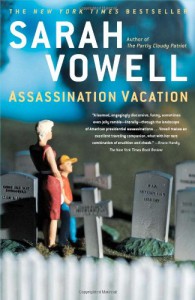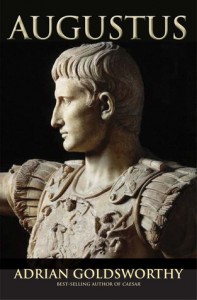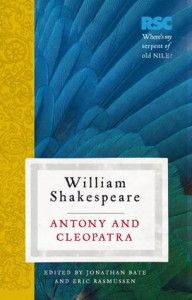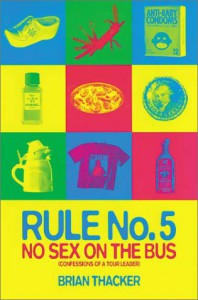Kerry
Hello! I live in London, and I like reading about history, travel and literature. I also like good non-fiction about things I don't know about yet, and adventures.
Currently reading

Jokey anecdote-led historical/travel non-fiction! I love all these things! Sarah Vowell is quirky teetering on the edge of Quirky – her elementary school nickname was Wednesday (as in Addams), what droll classmates she must have had – and she's written historical travelogue about American presidential assassinations, which is a great hook. It starts at Ford's Theatre, the obvious one, where John Wilkes Booth shot and killed Lincoln during a comic play, and she spends most of her time (around the first half of the book) on that assassination, using it to explore the idea of presidential assassinations in general before moving onto Garfield's and McKinley's. (She leaves out JFK, possibly because nobody wants to go to Dallas.)
A reviewer on another site said "Sarah Vowell finds herself funnier than I do", which I actually think is a good thing – you shouldn't put out a humourous book unless you think it's as funny as it can possibly be, right? I think I find Sarah Vowell about as funny as she finds herself, which is very.
She also has an excellent touch for details – she picks up on Lincoln's doctor writing that he had to hold the president's head up off the operating table all night, to prevent the blood from backing up in his brain. "The next day," Vowell writes, "surely his arms were sore, so sore I'd imagine that every time he had to lift something, reach for the salt shaker, say, he would throb with the muscle memory of Lincoln's heavy head."
The travelogue parts aren't just for amusing stories about game friends and very specific museums (not that there's anything wrong with that) but also for a bit of civilian historical detective-ing. For example, John Wilkes Booth broke his ankle while escaping, and it was reset by a Dr. Mudd. According to Mudd, Booth just happened by his home/general practice and forced him to set his injury at gunpoint; but he was accused and convicted of being part of the conspiracy, and historians disagree on whether Mudd actually was in on it or not. When Vowell tries to visit the home, she gets lost several times. She concludes that Booth must have known Mudd was a safe person to visit, as he couldn't have found his practice without knowing exactly where he was going.
There are a lot of direct references to then-current politics (the Bush administration; the book was published in 2005), which are jarring now mostly because that was such a bizarre time in America. It's hard for me to remember even just ten years later what a weird few years that was. Hindsight has mostly come down on the side of the most recent Iraq war being an embarrassing cock-up, and although Vowell's writing about feels a bit tryhard in 2014, it doesn't when I remember what it was like standing around in 2004 going "How is everyone not noticing that this is completely fucked up?" It was a weird time when reality and facts didn't seem to matter very much to anyone, and I don't blame Vowell at all for going "UM UM WTF" in a book about presidents.
Jolly, smart, geeky, has a bit of tooth, this is the kind of book I want to write.
 3
3
 2
2

On the plane to San Francisco I polished off this new biography of Augustus/Caesar/Octavian/first hottie of the Roman republic, which was released to time with the 2,000th anniversary of his death on August 19. He’s one of my favourite historical figures: my birth month is named after him and I love his characterisation in eg Rome and Antony and Cleopatra as a placidly ambitious weedy sociopathic teenage politician (so hot). Goldsworthy sets out to break down the boundary history has created between the young ‘Octavian’ (above-mentioned teenie sociopath) and the older ‘Augustus’ (wise emperor who created aqueducts, firefighters, decades of pax Romana, etc.), and create a picture of one man, and he does it clearly and thoughtfully.
Goldsworthy is I believe a military historian and he focuses a lot more on Caesar’s campaigns than on the questions I really want answered about his life, such as: How accurate do we think was that scene on Rome where he talks to Livia about spanking her? Because personally in that relationship I see him as more the spankee. Do you think that Agrippa and Julia went to orgies together, or was that more something she did on her own? Tiberius: probably terrible in bed, right? That said, Goldsworthy does get into some comedy anecdotes, like when Mark Antony was taking petitions in the Forum and he was so hung over he had to grab a friend’s cloak to throw up in, or when a provincial governor decided that the best way to get into Antony and Cleopatra’s good graces was to strip nude, paint himself blue, affix a fishtail (…where?) and dance in front of the Egyptian court on a festival day. (It worked, apparently, the guy had a very successful career.) For his part, teenage Octavian was reportedly much sought after by the adulterous matrons of Rome and very, very understandably so.
After the gossip, I was most interested in Goldsworthy’s look at the way Caesar developed his iconography, the way he chose to present himself to Rome and the world. Despite being effectively a military dictator, Caesar never called himself emperor: he was princeps, the first citizen of the republic, and carried out this odd contradiction of amassing power and squashing enemies while apparently genuinely believing in the republican ideal. Possibly, and this is the really surprising part, not because he was lying or self-delusional like a lot of dictators, but because Rome, which had been going through a civil war every 10-20 years for nearly a century, actually did just need one guy working hard for a few decades to make sure aqueducts were laid and firefighters were paid for and grain routes were secure. Caesar delegated to competent friends and colleagues, and brought up his extended family to be committed public servants. After using his famous uncle Julius’s name to boost his teenage power smash-and-grab, he didn’t take on anything that resembled hereditary power or titles; only ones that were specific to his accomplishments and would die with him. He apparently tried very hard to ensure there wouldn’t be just one guy in charge after his death. It was apparently just extremely bad luck that his carefully brought up network of young civic-minded future co-leaders nearly all died young, leaving his former son-in-law Tiberius as the last one standing and creating the position of One Guy In Charge almost by default.
Anyway it turns out ancient Roman teenage sociopaths = hot, ancient Roman teenage sociopaths who grow up to become dedicated public servants = hotter, Julia remains my favourite, this was among the clearer and wittier works of classical history I’ve read. Recommend.
Reading progress update: I've read 19%.

I've been reading Christine Donougher's translation of Les Mis on the Tube and I'm really enjoying it - it's clear, readable and a lot of fun. I'd missed how tense so much of Valjean's early story is, how well described his anxiety is, and how brilliantly paced and dramatic the scenes of "Valjean thinks about whether to do something" are, especially his deciding to steal the silver and to go to the court in Arras to turn himself in and save Champmathieu.
I'd just finished the trial last night, whipped through the super tense scenes where Valjean escapes from Javert, and was looking forward to What Happens Next!!! when:
Part Two: Cosette
Book One: Waterloo
nooooooooooooooooooooooooooooooooo
 2
2
"Antony and Cleopatra" by William Shakespeare (edited for the RSC)

I love these new RSC editions of plays, although the Kindle formatting of the playtexts themselves is absolutely dire. I buy them anyway because the ancillary material is so excellent. There are careful textual notes about all discrepancies between the Folio (which the texts are based on) and any quartos, great quality interviews with directors, actors and other theatremakers who have staged the play recently, and thorough performance histories both at the RSC and outside it.
I especially liked the A&C one because I learned that the Harriet Walter/Patrick Stewart production I saw in 2006 used a live snake named "Billy Snakespeare" for the asp.
Antony and Cleopatra is quite a good play and this is an excellent edition of it, except for the formatting issues on Kindle which unfortunately make it pretty useless as an acting text.
"Rule No. 5: No Sex on the Bus", by Brian Thacker

This was fine. Written by a tour guide of Europe booze cruises (well, bus tours) for 18- to 30-year-olds, this is a travelogue with a backstage (busfront?) look at the tours from the guide's perspective.
Thacker is pretty funny and I did enjoy the patronising yet affectionate tone in which he described his charges getting drunk, sleeping with each other, sleeping with locals, throwing up on locals, throwing up off the back of the bus, etc. He's like the gentle shepherd dog to a flock of naive, intoxicated sheep, staggering around from European city to city.
There is a bit too much about sex tourism - unlike college kids drinking $1 shots and bonking in the upper level of the bus, the institution of sex trade isn't particularly funny. Thacker also apparently liked to slip misinformation into his tour spiels and in the book shared his smug glee that no one on the tour caught on. I'm all for mocking stupid decisions but I can't fault young people for not already knowing the facts that he's supposed to be telling them. He also sneered at a girl who hadn't brought enough spending money for expensive Monaco, assuming she was too thoughtless to think ahead instead of possibly just unable to afford to bring more.
It was enjoyable reading about well-meaning young people making enthusiastically bad decisions, and Thacker has a good sense of imagery and comic timing. The book was fairly short, which was the correct length.
What this really made me want was a romantic comedy about a female tour guide and the driver on her tour, as they both drunkenly snogged their way through Europe only to realise what they really wanted...was each other.
 1
1
"The Genius of Shakespeare" by Jonathan Bate

Jonathan Bate is one of the RSC's resident clever people, and "The Genius of Shakespeare" is his discussion of What's So Great About Shakespeare Anyway.
The first half is a biography of Shakespeare focusing on his literary influences and the innovations he introduced. I was very interested in getting to the point and found this frustrating. Bate said at the end of the book that he intended to show his workings as a way of presenting his argument, rather than explaining the conclusions he had come to directly to the reader. I like that in theory, and it was very effective in the second half, but I was frustrated because I wanted to read about the problems around the idea of Shakespeare-the-genius and instead was presented with several hundred pages of well-argued, interesting literary biography.
The second half was about what I was interested in. Why do we associate Shakespeare with genius? What do we mean by "genius"? When did the meme of "Shakespeare, the genius" start, and why?
First, Shakespeare was praised for his supposed artlessness and natural talent. Ben Jonson's "little Latin and less Greek", Bate argues, was actually Jonson complimenting Shakespeare, that his friend was so naturally talented he could create great works without a university education. In the eighteenth century English nationalists picked him up as a counter to French neoclassical plays, which demand the three unities. Voltaire hated Shakespeare (the French translation was terrible, and it makes sense that French wouldn't be too keen to create a very good version, a stick to beat themselves with) and Shakespeare's messy, bursting-out plays vs the tight, stylistic tragedies of Racine et al was a way for English and French nationalism to seep into cultural arguments. Bate writes: "The veneration of Shakespeare as English national poet was in the first place a response to a patronizing and disparaging attitude towards his works on the part of French critics and a Francophile court taste."
The Romantics latched onto the idea of Shakespeare attuned to nature, inventiveness flowing like the Avon, and sonnets flowing from his tortured love-stricken soul. Bate says, "When Romantics get their hands on Shakespeare’s sonnets, the trouble begins." Authorship raises its head in the nineteenth century, for two reasons: for the first time, Shakespeare was more popular, and differently popular, than any other cultural figure; and the Romantic idea that a writer is directly expressing their own emotions.
Bate also traces Shakespeare's influence on non-English culture, like Berlioz and Césaire. He argues that what he calls the New Iconoclasts - people who argue Shakespeare's global influence is the imperialist hand of Dead White Male Culture - are themselves suppressing global artists who have consciously chosen to engage with Shakespeare as part of their own culture.
To the question why is Shakespeare a genius, Bate has several ideas, most coming down to successful plurality of voices.
- Drama is the only medium for "genius" in the way we mean, because it's the only medium in which many discrete and dissenting voices can be represented with equal weight.
- Shakespeare is the only English-language dramatist to successfully represent such a wide range of different voices - across classes, genders, philosophies, every aspect and perspective of life and situation.
- He has become a global 'genius' because a broader range of people across the world in history have been able to consume English-language culture than any other language. This is the result of imperialism, but that doesn't make it not part of other cultures. When you transmit your culture to the groups you oppress, you lose control of it, and it becomes theirs just as much as it is yours.
So Bate says these are the ingredients for what we perceive as genius:
Dramatist; plurality of an extremely wide range of voices; 300+ years old (for works to be tested in many different times and places and still speak to us); in the language of the world's majority/imperialist culture.
Bate thinks that if Spain had successfully become the major imperialist power instead of England, Lope de Vega would be "the world's genius", as he fits all of the above except the last one.
This is an extreme oversimplification of Bate's argument and ideas (he firmly says they are not "conclusions"), but it gave me a lot to think about. Particularly the ideas about imperialist culture being validly and equally part of oppressed people's culture as the imperial one; I hadn't thought about it in that way before.
He's also quite funny; here are some quotes I noted while reading:
"Richard II’s relationship to Edward II is so obvious that it is not very interesting."
On the anecdote about "William the Conqueror came before Richard III": "Shakespeare, with his usual eye for the main chance, pops in between the erection and Burbage’s hopes"
"There is a mystery about the identity of William Shakespeare. The mystery is this: why should anyone doubt that he was William Shakespeare, the actor from Stratford-upon-Avon?"
I love this:
"Pistol is a constant reminder that the price of Harry’s greatness is the rejection of Falstaff."
"But the point about Arthur’s bosom is that it is an earthly, an English, and a temporary resting place: the conceit is that Falstaff will rest with Arthur under Glastonbury Tor not for all eternity but until the land has need of him again, when he will return."
"Love With a Chance of Drowning", by Torre DeRoche

"Love With a Chance of Drowning" is a travel narrative by a young Australian woman who sailed across the Pacific with her Argentinean boyfriend after meeting him just a few months before. It's labelled a "memoir", but I have trouble applying that term to anything written by anyone as young as Torre DeRoche (in a nice way!).
I bought it because DeRoche is a travel blogger (at Fearful Adventurer) who self-published at first and then landed a fairly good book deal, and I'm pretty sure I want to do that (or something like it) too. It has also been quite well-reviewed and I'm happy to say I can add my voice to that side.
DeRoche is genuinely funny, and although I have zero interest in ocean sailing (or any type of sailing), it was a warm and accessible read. Her descriptions of the places they visited were beautiful, and I admire her ability as a writer to differentiate among lots of pretty, peaceful Pacific islands, which could have all run into each other. Instead I remember the cove where they met Steve and Carol, a silver foxy sailing couple in their '60s; the lagoon where they accidentally sail through the most dangerous entry in the area during a storm; the lovely resort island where they meet up with DeRoche's in-laws and are nearly kicked out of the hotel pool area for looking too scruffy.
I did get a bit fed up with the character of her boyfriend, Ivan, who I think would have driven me absolutely mad (which is why she's going out with him and I'm not!). Fairly predictable disasters occur due to his overconfidence - for example, she suggests they tie up their dinghy overnight during a storm, he says "It'll be fine! Stop worrying!" and the dinghy, surprise surprise, sinks - but I did like how the book wasn't a romantic love story, as I was expecting (worried) it would be. Torre and Ivan are in a happy relationship at the beginning of their journey and are in a happy relationship at the end of it, which was very narratively refreshing.
A very enjoyable story with sharp writing, and I'm glad I read it.
"Neither Here Nor There: Travels in Europe", Bill Bryson (1991)

I reread Neither Here Nor There last night, one of the books that I used to think of as one of the best examples of humorous travel writing. Bill Bryson is probably the world's most popular travel writer (he takes four of the top five slots of Goodreads' most popular travel books), and he is in fact very funny very often. But I found myself liking the book a lot less than I used to. Possibly that's because I've heard the jokes already, but I still laughed at them; my problem with it was that Bryson is a lot more mean-spirited than I remember.
His best quality as a writer is his very open enthusiasm for new experiences and places, but as I read I discovered that was limited to a certain kind of new experience. Bryson is basically socially progressive but culturally conservative, which isn't too terrible. He describes Sweden as "rich and socialist at the same time, two things I believe everyone ought to be", which I thoroughly agree with, and holds up the welfare state as one of Britain's greatest achievements, which I also thoroughly agree with. He also wishes that terrible architecture didn't happen in the middle of beautiful cities, and don't we all.
But the generosity and solidarity those positions imply doesn't extend to fat people, for example, or gay people or women. Bryson writes in detail every few dozen pages about the disgust he feels looking at a fat person in his line of sight (including occasionally himself in shop window reflections). He expects the reader to share his condescending contempt at accidentally walking in on a gay couple's hotel room as they're having sex, and shares his sexual fantasies about teenage girls and bare breasts uncomfortably often.
He also wishes, eg, Italian police would simply "force" Romanis off the streets of Italy, and while I do genuinely think he believes they should be allowed access to state help, he doesn't explicitly say so; he writes more along the lines of "get these annoying brown people away from my nice European cobbled streets" and imagines them feasting on "truffles and Armagnac" on their supposed begged fortunes. And a joke that "veiled women and Arabs in nightshirts" are sacrificing a goat as part of a regular banking transaction is particularly delightful (read: racist).
I do think Neither Here Nor There is still worth reading if you haven't yet. Bryson travelled in the late '80s, so the Dalmatian coast was still "Yugoslavia" and Sofia was still Communist, and the stories about these places near the end of the book are the most interesting, describing worlds that simply don't exist any more. The sections about Italy are romantic and well observed, and made me want to go to Capri immediately, which is a good thing for travel writing to do. It's also, again, still mostly very funny, even if Bryson badly misjudges the targets of some of his jokes. But I don't think I'll read it again.
Les Miserables: new English translation by Christine Donougher

Welp, I'm attempting to read "Les Miserables" for the first time since high school, in a new translation that's just come out this month (November 2013).I'm not planning to get through it quickly, or to devote all my reading time to it - it's nicknamed "the brick", for god's sake - but I'm excited about the idea of new translations and especially for big sweeping works, and it's been a while for this one.
Also excited about seeing whether 27-year-old me still has the girlboner for Enjolras that 17-year-old me did (revolution!).
"The National Uncanny", by Renee L. Bergland

Firstly, nothing I write will be able to compare with this review by rushthatspeaks on Dreamwidth, which is how I found out about this book. They start:
By the time you finish reading this review, I intend to convince you that you have seen a ghost. I believe that in the majority of cases I will be successful.
Yes, I do mean you, whoever you are, reading this now. And yes, by ghost I do mean a spectre raised from an untimely grave to torment the guilt of the living and deny the peace of the dead, and by seen I mean seen, with your eyes, or possibly in some circumstances heard with your ears; I mean these things absolutely literally.
Having said that, I will now proceed to tell you that this slender little book of literary criticism, The National Uncanny, is one of the very best books I have read in an extremely long time, one of those books which makes the inside of the reader's head a different and a better place.
And they're right. On both counts.
This is probably the best book I've read all year. It's one of the densest, in a great way – it's fairly short (the content, not including notes, goes up to 169 pages) but every page has an exploding idea (I should say, at least one exploding idea) that makes you shake out your assumptions and look at them again or go, "oh my god, that! That is the thing I've been trying to put my finger on for all of literature!"
I know it's a cop-out but I really don't think I can add to the review I've linked above – read it, then read this book.
Elizabeth of York: A Tudor Queen and Her World, by Alison Weir

Last week was the Storm Of The Decade here in England and Wales, and lucky me it was my day off so I got to sit around reading historical books!
Elizabeth of York: A Tudor Queen and Her World
I mean, it's Alison Weir so you know it's going to be pretty good. I enjoyed reading about young Elizabeth, whose part in the closing years of the Wars of the Roses is surprisingly overlooked for how crucial she was.
Elizabeth was the eldest child of Edward IV and Elizabeth Woodville, born in 1466 into a relatively secure court (at least compared with the previous several decades). Her father was briefly dethroned in October 1470 by Team Lancaster, and fled to his sister's court in Burgundy, but that didn't last long and he was back in Westminster by April 1471. Elizabeth grew up in a fairly peaceful court with parents who loved each other.
In 1483, when she was 17, things kicked off: Edward died unexpectedly and his youngest brother, Richard Gloucester, became regent. The widowed queen Elizabeth Woodville took her children, including Elizabeth of York, into sanctuary at Westminster Abbey (except her oldest son with Edward IV, also named Edward, who wasn't in London at the time). Prince Edward came to London to be crowned and his brother was persuaded to leave sanctuary and go to the Tower with him before his "coronation".
The two princes rather famously disappeared, and Richard Gloucester became King Richard III. Elizabeth and her family left sanctuary and a bit of weird stuff went on between her and Richard, including a letter where she seems to express frustration that his wife, the queen, Anne Neville wasn't dying fast enough. Elizabeth also had an on-and-off engagement with Henry Richmond, the son of the Lancastrian heiress Margaret Beaufort who was living in exile in Brittany (northern France). In 1485 Henry Richmond invaded England, killed Richard III, became King Henry VII and married Elizabeth.
Weir writes very cleanly and evocatively, and the first part of the book is exciting: there's some derring-do with Elizabeth's engagement to Henry Richmond, a plausible discussion of her Mean Girls "Why won't your sick wife just die already?" letter to Richard III and a nice characterisation of Elizabeth's relationship with Margaret Beaufort, who can be portrayed as a wicked stepmother because of her (hilarious and wonderful) regal tendencies once her son became king. (I'm a big Margaret Beaufort fan, particularly after Amanda Hale's excellent goofy portrayal of her in The White Queen which was otherwise Not Very Good.)
For me the issue is that Elizabeth's life was extremely eventful until she married Henry VII and then she had several decades of good health, some tragedies (typical of the period such as children dying young) and a relatively happy marriage with a respectful, affectionate spouse. Which is nice for her, but not a very compelling dramatic structure.
Weir tries to spice up the latter half of Elizabeth's life with anecdotes about Christmas celebrations, marriage negotiations and the two Pretenders - one claimed to be the son of Edward IV's brother George, one claimed to be Elizabeth's youngest brother - but the book gets a bit bogged down in details around clothes and customs, mostly because that kind of information, like wardrobe records, is all we have about Elizabeth after her marriage. There's a lot of "Elizabeth must have _____" speculation because we simply don't know a lot about her.
That said I did really enjoy seeing the transition from the Wars of the Roses to Tudor England through Elizabeth. She was extremely popular and it seems she was intelligent, a good strategic thinker and a happy and competent queen. Weir points out how difficult the repeat Pretenders must have been on her – these were people supposed to be her cousin and dead brother, after all, and especially with the anxiety of not knowing exactly what had happened to her two brothers it must have been very difficult, particularly since a lot of their funding came from her aunt, Margaret of Burgundy, who had a lot of money and enjoyed trolling Henry VII. (Margaret of Burgundy also cracks me up. I'm really into medieval Margarets.)
I had thought of Elizabeth of York as being a bit wet but Alison Weir's characterisation of her is very strong – I mostly ended up cross that she wasn't a character in Shakespeare's excellent history plays, which have wonderful women in them. Elizabeth was a central figure in so much of the action during that time but she's been really overlooked in my opinion; I'm glad I got over my first feeling of "a whole book about Elizabeth of York? Really?" and read it.
I received a copy of "Elizabeth of York: A Tudor Queen and Her World" from the publisher via NetGalley for free for review purposes.
Hello! This is my first try at properly cataloguing and reviewing the books I've read. I have a LibraryThing, but I've decided not to try to import it here - this will just be a record of books I have read and/or reviewed from November 2013 on.
I just finished Alison Weir's new book on Elizabeth of York and am planning to write about it here; I'm in the middle of The National Uncanny, a 1998 academic book on the spectralisation of Native Americans in American literature.
I really like the setup of Booklikes and I'm looking forward to having a good place to talk about books with book people.












 1
1